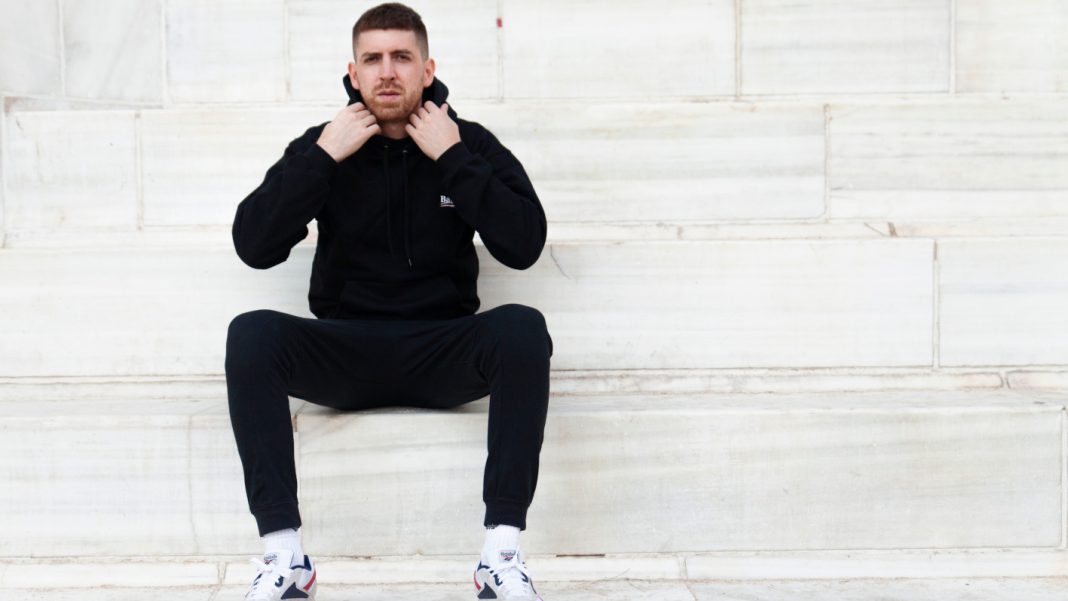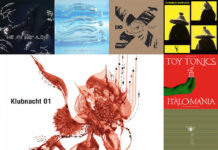
Photo: Press (Regal)
Regal doesn’t mince words and something similar can be said about the Spain-based Italian’s music: his muscular tracks are built around thundering kick drums and laced with more acid than you could find in Aleister Crowley’s cupboard. His latest EP for Ellen Allien’s BPitch Berlin however saw the Involve founder explore terra incognita – breakbeats, even some guitar sounds featured prominently. Perhaps a foretaste for bigger things to come, since when not playing at Tbilisi’s Khidi, where he holds a residency, Gabriel Cassina is working on new music, including his debut LP. Regal’s mix for our Groove podcast brings together tracks the DJ does not usually play in his club and festival sets – but, of course, offers a wild ride nonetheless.
When I interviewed her in early 2019, Miss Djax spoke very highly about you, presumably because your sound draws on the acid techno that she herself pioneered in the early to mid 90s. You also have mentioned Emmanuel Top as a key influence. When and how did you get in touch with this particular style and what is it that fascinated you so much about it?
To be honest it’s something I cannot really explain. Before I properly got into techno I used to hear a lot of so-called acid without even knowing that it was called this. It was just a kind of a sound that would stimulate my brain in a different way than all the other electronic music I had heard until then – I enjoyed listening and dancing to it much more than I did when listening to other tracks. It was only a few years later, when I started producing music, that I discovered this sound was called “acid”.
Your recent The Eyes EP for Ellen Allien’s BPitch was arguably more experimental in style and tone than your previous releases. How did this shift come about? You have said previously that most stylistic changes in your work are the result of a creative crisis.
Exactly, it happens that I have a creative crisis sometimes and just don’t know how to get on track again. That’s really frustrating on the one hand, but on the other it helps me to try out new things, escape genre boundaries and explore new ways of shaping a track without sticking to a genre cliché. Of course I try not to change my style in a radical way – I would say that I try keeping my style, but work on the tracks in a different way while giving them a different twist. On „The Eyes,“ the title track of the EP, I kept my usual acid style, but instead of giving it a 4×4 beat I tried out a breakbeat one.
Apart from your solo work, you have also worked together with Figure boss Len Faki and Milton Bradley under his Alien Rain alias. What in your eyes makes a good collaboration?
A good collab always starts by having a good personal relationship. Sharing thoughts and ideas with the other person and being on the same wavelength is very important even if the sound of the two people working on the same project is different. By having a good personal connection I believe it’s easier to reach a middle point and agree on a common denominator when finding a sound for the project.
With your label Involve, you were instrumental in kick-starting the careers of Boston 168 and other producers. What was your motivation to start Involve, and what does the label stand for at the end of 2019?
Actually, the main motivation when founding Involve was to have a platform where I could release my music without having to deal with A&R’s, waiting times or even sound requirements from the label. Nowadays Involve has become a platform not only for myself as an artist, but also for people I really like, not only as artists but also as human beings. It’s also about giving people who really deserve it the chance to showcase their skills to a broader audience. I would say that I’m trying to build up a small family – Involve has become more than just a techno label for me and the people involved in this project.
You have been a resident at Tbilisi’s Khidi club for a while now. How did it come about? Georgia is not exactly around the corner from where you live.
Actually I got the offer of becoming a resident right after my first gig there. It looked like both the crowd and the promoters liked my style and enjoyed the set I played. I don’t know what it was, but it felt like there was a really strong bond between the people at Khidi and me. I felt there was a special connection to the crowd from the very first moment I started playing. I feel lucky being a resident in such a great club and am super thankful for the chance given to me – the crowd in Tbilisi is definitely a very special one and I’m already looking forward to the party on new year’s eve at the end of the month!
The city’s scene has been receiving a lot of attention recently and draws in techno tourists and international DJs alike. What makes the scene there stick out – and what does this residency mean to you?
The main difference I’ve noticed between the importance of electronic music in Tbilisi and in other European cities is that in Tbilisi it’s not just part of the people’s leisure time – it plays a big part in their lives as well. Electronic music is part of a socio-political movement that tries to bring some change to a country plunged in a political crisis. In Georgia, Techno still has a similar significance to what it had in Detroit 30 years ago. For this reason, I believe that the residency at Khidi brings a bigger responsibility than it would do elsewhere. Musically, I try to play eclectic sets, bringing in tracks that I believe fit the rave spirit of Tbilisi’s scene and which sound new to them – which doesn’t necessarily mean I play new tracks, but maybe just some unexploited, unknown old school tunes.
What was the idea behind your contribution to the Groove podcast?
I wanted to play some records that I really like, but rarely play in my sets. When playing in clubs or festivals I sometimes feel that if I would play a certain track I would kill the vibe even if it fits music-wise, but when doing a mix I’m more free to play what I feel in that very moment. I don’t have to focus on the people’s reaction and don’t have this pressure of keeping the dancefloor busy.
Last but not least: Where can we see you behind the decks in the near future and what are your plans as a producer and label owner?
I have many gigs in my schedule for the next year and I’m really looking forward to playing at all those great venues! The NYE night at Khidi marks the start of the year and after a gig in Spain I’ll fly over to South America to play a tour right at the beginning of the year. After that you can expect to find me at some great clubs and festival this year, so stay tuned! Regarding the label, for the next year I will try to push the core artists of Involve a little more, but besides bringing out some new EP’s with unreleased material by them I’ll also try to finish some collabs I have on my wishlist for the end of the year. However, aside from the tracks I’m finishing for new EP’s, I’m also working on my first album, which will see the light of the day not before the end of 2020. I’m really excited about this one as it’s a huge project for me and will be something very special.
Stream: Regal- Groove Podcast 236
01. Lady Starlight – AC1
02. Black Kawasaki Ninja – Drum Machine Hooligan (Hadone Remix)
03. Benk – Vibration
04. Ryan Eliott – Get To You
05. Tim Tylor & DJ Slip – Pleasure Unit (Bloody Mary Remix)
06. Vlaysyn – Sonic Fiction
07. Submerge & Hiroko Yamamura – X.AN 112 (Black Asteroid Remix)
08. Temperature Drop – Icepack
09. Dave Black – Break The Pill
10. JKS – Rock The House
11. Rove Ranger – Unstable Current
12. Gijensu – Need For Lead (Schacke Remix)
13. Mount Palomar – Troublesome Teens
14. FJAAK – Transmission
15. Klangkuenstler – Der Letzte Tanz
![[REWIND2025]: Die 20 besten Singles des Jahres](https://groove.de/wp-content/uploads/2025/12/EPs-2025-Header-218x150.jpg)



